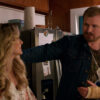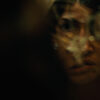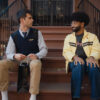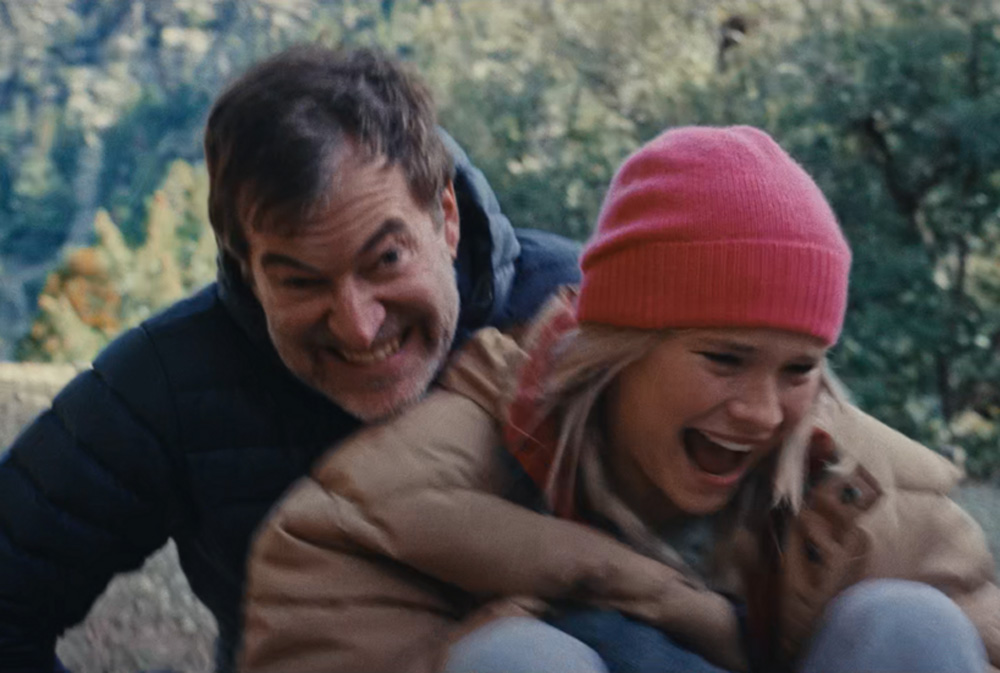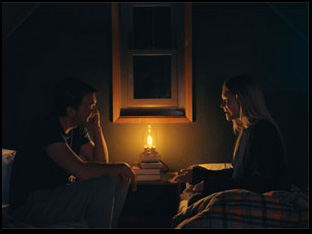Something’s missing when Claire (Ora Duplass) and her father (Mark Duplass) head up to the family’s cabin retreat for a winter weekend when “Oh Christmas Tree” begins, yet the room they share is filled with love as they sing the holiday standard, completely in sync on the keyboard and guitar. But the rest of the day reveals that to be a rare occasion these days as they go through the motions of other traditions such as sledding and home cooked meals that at once can be comforting and at the same time slightly surreal when they know that something’s off. When Claire says to her father playfully, “Dad, the moment’s gone, let it go,” as he insists on resetting a camera phone to capture them on the sleigh together, neither of them seem to be entirely conscious of what she’s really trying to tell him.
There’s a lot going on in the beautifully bittersweet short about moving through grief, keeping certain rituals that bring comfort and discarding the ones that only remind of absence and while certain aspects of this particular trip to the mountains may be one to forget for the Griswolds, it is certainly likely one to be cherished by both audiences and the Duplass family when it so clearly introduces a new star in the 16-year-old Ora and bears all the best qualities of her parents’ work, with Ora’s mother and Mark’s wife Katie Aselton directing. A lighthearted affair that seriously contends with processing loss, the delicate two-hander is handled with considerable grace as the father and daughter learn how to engage with each other again with the flicker of hastily thrown up Christmas lights reflecting a spark waiting to be reignited, even as the thought of selling the cabin has put been put on the table.
They may be treading on emotionally treacherous terrain on screen, but it is no surprise to learn that “Oh Christmas Tree” was born after Ora expressed a desire to join the family business and when both Aselton and Mark Duplass have a history of making other actors feel comfortable, leading to such lively dramas and comedies such as the Aselton-helmed “The Freebie” and “The Puffy Chair” (co-directed by Duplass with his brother Jay), she clearly takes advantage of the room for expression, delivering a mighty and assured turn as a young woman who is anything but when Claire puts on a brave face for her father’s sake, but worries she could buckle by shouldering responsibilities beyond her years. With the film recently starting its festival run at Tribeca en route to the Nantucket Film Festival and eventually to becoming a holiday staple, it was quite the privilege to get to talk to the creative trio behind “Oh Christmas Tree,” the real family dynamics that went into it and how Ora may not have had to convince her parents too much that a career in movies might be the right path for her.
Mark Duplass: I really wanted to write something small for Ora and I to do on screen together. We’ve been making dumb little things at home for years, and we’ve been trying to stave her off from becoming an actor for years because we didn’t want her to become a—
Katie Aselton: …Insufferable child star.
Mark Duplass: Damaged child actor. [laughs] We were like, “Just stay in school, enjoy your childhood.” But recently she illuminated some things to us, like “Being a kid sucks now and it’s hard and high school is terrible for all of us, so will you please just let me go and start my career?”
Katie Aselton: And we decided Hollywood was actually a safer place than high school. [laughs]
Mark Duplass: Yeah, it was us revisited. When Katie and 15 and 16, we were just begging our parents to let us go.
Katie Aselton: Yeah, it was almost the exact same age that we all had our epiphany of “This is who I am. Don’t hold me back.” So we decided to try to not hold her back and actually lift her up and provide an opportunity. That was the impetus of this movie. It felt so safe and easy if it was us and we kept it in the family, because if it stunk, no one would have to see it. We could just delete.
Ora Duplass: We had a safety net.
Ora, I’d love to hear this from your perspective. What was it like stepping into this?
Ora Duplass: Obviously I grew up around this my entire life with [my parents] getting auditions, [and seeing] the joy of getting the role, and the disappointment of rejection, so I’ve seen the ups and downs of it all and been able to weigh all of the pros and cons of it. The bottom line was “This is what I want to do.” I’ve done theater since I was four and I’ve just loved every single minute of performing and of becoming a character. It is just so exciting to me, and it’s been so great to have their support now and really just jump in and be able to give my all to what I want to do.
Like [Katie] said, Hollywood is a safer place than my high school. It sucked, and [I felt] why am I wasting time here when I could be building something for my future, which is something that I’ve wanted for so long, so this short was a stepping stone for things to come in the future and it was a really great safe space to start because I was with my parents. It was in a small setting. I had one cameraman and I was able to fully give myself to the film and I just loved that this was my starting point before everything coming up. And I loved how it turned out and how it’s touching everybody.
Katie Aselton: I also think it’s a great lesson to learn at such an early age that you don’t need the studio system behind you to make a good thing. It took me until I met Mark and Jay. I struggled for like seven years in Hollywood waiting for permission to act, and it was Mark and Jay who taught me with “This is John,” “Scrabble” and “The Puffy Chair,” that you just pick up a camera with your friends and go make something and throw your heart into it and that can be its own beautiful experience. So I’m so happy that she got to learn that at 16 versus her mid-20s.
Katie, what was it like to create a space for this, both in terms of comfort and also aesthetically when you use the room so beautifully in terms of angles and the light?
Katie Aselton: Look, I love all the sides of making movies and as an actor who is a director, performance is so important to me. Authenticity and creating really organic moments came so easily to these two — talking about their emotions is like a Tuesday morning for us.
Mark Duplass: We’ve been doing this for a long time.
Katie Aselton: We are a very emotionally open family, so I knew performance was not going to be an issue in finding those real, authentic moments. Then it was really just [asking] aesthetically, how do we tap into nostalgia? It’s all creating vignettes and looks and I just wanted emotion to be at the top of everyone’s minds. I think you can do that visually and with the performances, so it was really fun to play with both of those things.
Mark Duplass: And I want to toot Katie’s horn a little bit too on that. As a director, I’m so obsessed with performance, sometimes to the detriment of production design, lighting, and all of those other elements. And I remember when I brought this idea to Katie, she was [instantly said], “Christmas lights! We have to have the strung up Christmas lights behind them, so it’s a perfect metaphor for trying to make the tradition happen, but they just kind of taped them up on the wall [so you can feel a certain absence].” That combination of the visual aesthetic combined with the emotional performance stuff was like, “Oh, that’s what we want.”
Mark, how did the actual storyline of this come to you?
Mark Duplass: My creative process is always reverse engineering. What are the available materials that we have? Let me try and create something creative inside of that bucket. We just bought this cabin up in Mount Baldy that’s about an hour outside of L.A. and I love the aesthetic of it and the coziness of it. It has a nostalgic feel to it anyway. So I thought we should write something to shoot in there and I wanted to do something on screen with me and Ora.
I felt a father-daughter dynamic would be interesting. There’s no secrets in our family, for better or worse — Ora knows me really, really well and I know her really, really well. all of us, it’s just, it’s out there, you know? So these themes of how can Ora and I examine a little bit of the changing dynamics between a father and a daughter when that daughter starts to become a teenager. At the same time, I wanted to examine how mental health has played such a big part in my life and in Ora’s life, and put those two themes in there and play with them in a fictionalized situation so it’s separate enough that Ora and I don’t have to feel like “Oh my God, we’re playing ourselves,” but we are playing enough of the things that we know how to deal with so it feels true. I really like that recipe for a film that’s basically half the actual truth of what you’re doing and more half of just the emotional truth of what’s happening.
Katie Aselton: I also want to toot Mark’s horn.
Mark Duplass: Toot my horn!
Katie Aselton: What I love about this script is how I think we don’t always get to see a 16-year-old who is holding a lot. We see 16-year-olds who are troubled and 16-year-olds who are moody, but there’s this whole generation of kids who are holding the weight of their parents’ trauma and grief, [which] I think is a really interesting perspective that’s so important to acknowledge because these are young adults and they take responsibility for the adults around them very often. And I think Ora portrayed that so beautifully.
Ora Duplass: Yeah, that’s a big part of the film for me. I feel that scene in the bathroom where she’s really internalizing everything that’s happening with her dad — you don’t really know exactly what’s happening with him, but you can tell that she’s feeling the weight of something — that was a scene that I felt like it was really important to portray what Claire was feeling.
Mark Duplass: That was your idea. That wasn’t in the first draft. I gave that to Ora and she’s like, “You’re doing a subtle thing, but we need to see what’s going on with her.”
Ora Duplass: Yeah, with Claire, it’s like she can’t even experience what’s happening in her teenage world because she is so constantly anxious and trying to keep her dad [going] so that she doesn’t lose the one last thing that she has in her life, so it’s really hard for her. You could tell it was hard for her to say that to him because she’s scared and she doesn’t want to hurt him, but she needed to tell him not only to protect him, but to protect herself because she’s been dealing with this horrible weight. And it’s hard for a 16-year-old to feel like she’s keeping her dad alive. That’s terrifying.
Katie Aselton: She’s still a little kid who gets butter on her face. It’s such a tricky age where you have one foot in adulthood and one foot in childhood.
Ora Duplass: Yeah, a big thing that I think about when going into a character is protecting your character, so going into Claire, I was just keeping some of my consciousness as myself, and then also thinking I needed to protect Claire at all costs and don’t judge any feeling that comes when you’re being her. Just feel everything that she is feeling and let it be what it is. With this, she was feeling thousands of different emotions, trying to reconnect with her dad, but feeling that depression, but not letting herself show it, so it was a lot and in a 10-minute short film, it was hard to fit everything in there, but I know they did a good job of just painting the picture enough so you can get the emotional feel of the film.
Was there anything that came out on the day that changed your ideas of what this could be or took it in a direction you didn’t expect?
Katie Aselton: My favorite thing was what I mentioned in the dinner scene [when] Ora took a bite of the bread [at dinner] and it got butter smeared on her [cheek]. And I was like, “Oh, we’re keeping that.” It was such a beautiful [moment] because dad wiped it off. It is like this beautiful reminder that she’s still just a kid.
Ora Duplass: But then it became a stunt —I had to repeat it every time. How do we bite it in such a way that we get on the cheek?
Katie Aselton: I’m like, “Get it on the cheek!” But that was a really sweet surprise. Then working at the sledding scene, there was supposed to be snow up there…
Mark Duplass: We had to rewrite it the week before, realizing there would be no snow. I think it added to the pathetic picture of [trying to keep this tradition alive].
Katie Aselton: Recreating the memories. I also feel like that scene actually got a little bit more emotional on the day than it was written.
Ora Duplass: The sledding scene, when he was trying to film it, And then she was like, “Moments over, let’s go back inside. Stop doing this, this is stupid.” And then he’s like, “No, no, no, one more time, one more time. I need this memory.” And so it’s like a lot of what growing up is and your dynamic changing with your dad, right? In that scene, because he just wants to see you as that little girl, but you can’t really be that as much as you want to be. You can’t turn back into that right away. You’re trying to have those memories, but you can see the pain in both of their eyes when…
Mark Duplass: You want to give it to him, but you can’t. And the thing about traditions, which are so wonderful and so terrible are that you are revisiting this older version of yourself, not only last year, for all the years to come. So you do this family tradition and there’s this subconscious expectation that we’re all going to be some version of ourselves that we were and the child feels like we’re doing this tradition so the parents can experience me like I was at eight, nine, or 10 years old and they start feeling the pressure to be like that. Then you start seeing the ghosts of who you were back then.
Ora Duplass: There’s pressure.
Mark Duplass: Tricky, you know? And we have a lot of family traditions, so the whole thing was really fun to navigate. I think the space for me that was the most interesting is that as a dad, I’m always trying to find the line between let me provide an emotional space of parenting that lets my children know everything is okay and they’re safe, and the parents are strong enough to hold things. But at the same time, I want them to know that I’m not a superman, I’m vulnerable, I have my own mental health stuff, and where is the right balance for that? And it’s different at every age. I think the Duplass family does a pretty good job of managing that overall…
Katie Aselton: I think the kids would be the better judges. [laughs]
Mark Duplass: No, I’m going to tell you right now, we do it good. [laughs] But what makes the film interesting for me is when you have a calamity drop to that soup that is normally working pretty well. Of course, that’s going to tip you over the edge and that was the fun element at play here.
Ora Duplass: But as far as surprises, the biggest really was finishing the day and [thinking], I think we got something really beautiful. We went into this thinking it was going to be a home movie that we could look back on and be like, “This was a cute little Saturday.” This was not [intended as] something huge. Then when I got my dad coming up the stairs being like, “We got into Tribeca,” I was like, “That thing that we made in the cabin? Are you kidding me?” But as soon as I got to see the reactions of everyone after seeing the film, it was so Incredible. It just made me so happy because I think this is a story that’s not usually portrayed on film. It’s really what’s underneath the surface of it all, so to be able to see that people got the message and connect it to their own lives was really beautiful. It made me feel like we really did something and that’s just the most rewarding part of it all.
“Oh Christmas Tree” will next screen at the Nantucket Film Festival as part of the Narrative Shorts Program: Tough Stuff on June 22nd at 1 pm at the White Heron Theatre.
